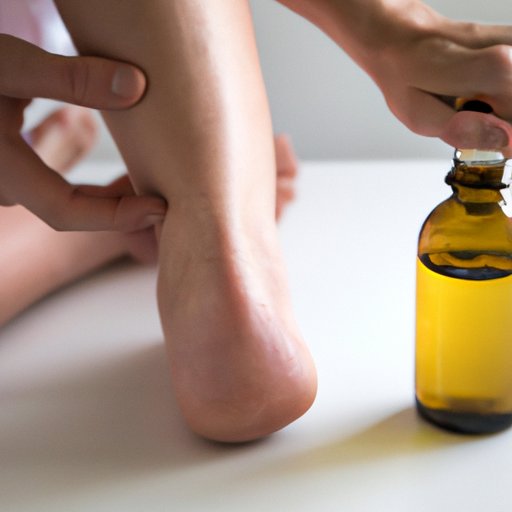
I. Introduction
Cramps can be an uncomfortable and painful experience that affect individuals of all ages and lifestyles. Almost everyone has experienced a cramp at one point, and they usually occur in the legs, feet, and calves. Cramps are caused by involuntary muscle contractions that can last for a few seconds or several minutes. In this article, we will explore different methods to get rid of cramps fast and effectively, so individuals can go back to their daily activities without any discomfort.
II. Stretching Exercises to Alleviate Cramps
Stretching has been found to be an effective way of relieving cramps. Gentle stretches can help lengthen the muscle and reduce the intensity of the cramp. Some stretches that can be done are:
- Hamstring stretch
- Calf stretch
- Quad stretch
- Inner thigh stretch
It is essential to keep in mind that stretching should be done gently and slowly. Avoid overstretching or bouncing, which can lead to further muscle damage. Regular stretching can also help prevent cramps from occurring in the future.
III. Apply Heat to the Affected Area
Heat can help to increase blood flow and circulation, which can help to alleviate the cramp. Heat can be applied in different ways, including:
- Using a hot water bottle or heated rice pack
- Soaking in a warm bath
- Using a heating pad
It is crucial to be cautious when using heat and make sure that it is not too hot to avoid burns. Heat should not be used on areas that are bruised or swollen.
IV. Using Ice Packs
Ice packs can be effective in reducing pain and inflammation caused by muscle cramps. Ice can also help to numb the affected area and provide relief from the cramp. To use ice packs, wrap the ice in a towel or cloth and apply it to the affected area for about 15-20 minutes. Repeat the process if necessary.
Be sure to remove the ice pack if the skin becomes numb or red, and do not apply ice directly to the skin, as this can cause frostbite in severe cases.
V. Supplements for Cramp Relief
Supplements can be an effective way of managing cramps, especially if the cramps are caused by nutrient deficiencies. Some supplements that can be beneficial include:
- Magnesium – helps to prevent muscle spasms and cramps
- Calcium – helps to regulate muscle contractions
- Potassium – helps to regulate fluid balance in the body and reduce the risk of muscle cramps
- Vitamin D – helps the body to absorb calcium for proper muscle function
Individuals should consult with their healthcare provider before taking any supplements to determine the correct dosage and potential side effects.
VI. Essential Oils
Essential oils can help to relieve pain and inflammation caused by muscle cramps. Some of the top essential oils for cramp relief include:
- Lavender oil – has calming and soothing properties that can help to reduce muscle tension and cramps
- Peppermint oil – has cooling properties that can help to reduce pain and inflammation
- Chamomile oil – has anti-inflammatory properties that can help to reduce muscle spasms and cramps
- Ginger oil – has warming properties that can improve blood flow and reduce muscle pain
Essential oils can be used topically by mixing them with carrier oils like coconut oil or jojoba oil. Oils can also be diffused or inhaled.
VII. Hydration and electrolyte-rich drinks
Staying hydrated is essential for preventing cramps, especially when exercising or in hot weather. Adequate hydration and electrolyte intake can be achieved by consuming:
- Water
- Citrus fruits
- Coconut water
- Sports drinks
Individuals should be cautious when consuming sports drinks as they typically contain added sugars and calories that can be harmful to the body with extended use.
VIII. Massage Therapy
Massage therapy can help to relieve muscle tension and spasms, leading to cramp relief. Different massage techniques that can help include:
- Deep tissue massage
- Swedish massage
- Trigger point therapy
Individuals can do self-massage at home, but it’s essential to be cautious and apply gentle pressure to avoid further injury.
IX. Conclusion
Cramps are an unpleasant experience, but it’s essential to know that there different remedies that individuals can try to alleviate the pain. The methods discussed in this article are not exhaustive, and individuals can try different treatments to find what works best for them. The following methods can alleviate cramps:
- Stretching exercises
- Applying heat or ice
- Taking supplements
- Using essential oils
- Keeping hydrated and consuming electrolyte-rich drinks
- Massage therapy
Overall, individuals should be sure to consult with their healthcare provider if they experience severe cramps or if the cramps persist even after trying different remedies.




